The Checker Maven
The World's Most Widely Read Checkers and Draughts Publication
Bob Newell, Editor-in-Chief
Published every Saturday morning in Honolulu, Hawai`i
Noticing missing images? An explanation is here.
Oldies But Goodies
Having completed republication of the introductory section to Willie Ryan's classic Tricks Traps & Shots of the Checkerboard, this month we swing into the main part of the book: a compendium of situations both famous and not-so-famous. Today, we present two classics which you've most probably seen before. If so, you'll have no trouble solving them.... right?
Here's Willie in his own words.
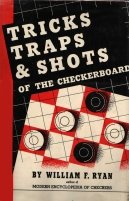
Don Canalejas' Cannonball
Almost 300 years ago, a Spanish mathematician, Don Canalejas, pointed out the most famous of all booby traps, a five-move demoralizer. This is the first pitfall the student should learn to avoid. Set the pieces up for play. Then move 11-16, 23-18, 16-20, 24-19, 8-11---A, forming the position on the adjoining diagram.
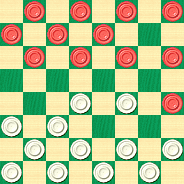
WHITE
White to Play and Win
W:W18,19,21,22,25,26,27,28,29,30,31,32:B1,2,3,4,5,6,7,9,10,11,12,20.
The Fool's Trap
Another premature opening procedure, which frequently embarrasses the beginner before he gets half started, is the Fool's Trap, another five-move paralyzer second in importance to Canalejas' Stroke. Set the pieces up for play. Then move 10-15, 23-19, 6-10, 22-17, 11-16---A, and we arrive at the situation shown in the diagram.
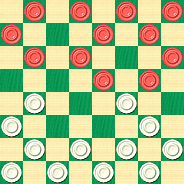
WHITE
White to Play and Win
W:W17,19,21,24,25,26,27,28,29,30,31,32:B1,2,3,4,5,7,8,9,10,12,15,16.
In each problem, find the winning move for White, and correct Black's play at A. Click on Read More to check your solutions.![]()
Checker School: Coming From Behind, Part 3

The final installment of our three-part lesson on man-down draws is a triplet. In the first two settings we'll see more ways to come from behind, while in the third setting, alas, we won't be able to pull it off.... but from this we'll learn what to try to avoid.
Ever been a man down in an endgame? Not you, right? As we've said in the other lessons in this series, it happens to everyone. Saving the draw, when possible, is an important skill to master. If you're a student, study this lesson carefully. If you're an advanced player, a review of what we take to be "obvious" can never hurt!
Let's start out with this position:
WHITE
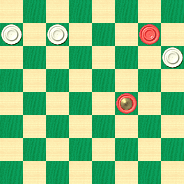
BLACK
Black to Play and Draw
Next, the famous Payne's Double Corner Draw, which should be learned by everyone who ever touches a checkerboard:
WHITE
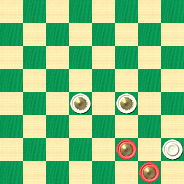
BLACK
Black to Play and Draw
And finally, a lost opportunity, to be contrasted with the very similar-looking Payne's Double Corner Draw:
WHITE
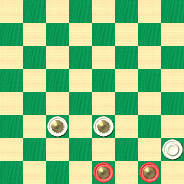
BLACK
Either to Play, White Wins
Take your time working these out, and then click on Read More for solutions, a sample game, supplementary problems, additional examples, and a host of detailed explanatory notes.![]()
The Simple Life

This past holiday season was filled with the usual hustle and bustle, and often stress triumphed over enjoyment. Many of us are a bit relieved, in fact, to return to the simpler, more ordinary days of the year.
Here's a Tom Wiswell problem, then, that seems to promise us the joy of simplicity.
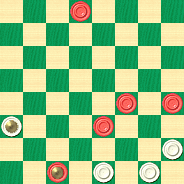
WHITE
White to Play and Draw
W:WK21,28,31,32:B2,19,20,23,K30.
White is a man down but regaining it is child's play. Has the simple life arrived, and have we solved a Wiswell problem in mere seconds?
Alas, life is not easy, and neither is this problem. Can you, without too much stress, see through to the solution, and bask in contented post-holiday enjoyment?
Don't fret. You can always click on Read More to check your answers.![]()
The New Year Rushes In

Click on a problem to display it; when you're done, click on Read More to check your solutions.
But above all, enjoy the New Year and keep on reading the weekly editions of The Checker Maven!
New Year's Eve Speedster No. 1
New Year's Eve Speedster No. 2
![]()
A Holiday Puzzler

Whatever holidays you celebrate, The Checker Maven wishes you the best of the season and hopes you enjoy this special challenger, our holiday gift to you.
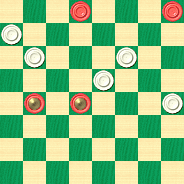
White
White to Play and Draw
W:W5,9,11,15,20:B2,4,K17,K18.
White may be a man up, but Black has two kings and a strong position. Can you provide some holiday cheer for the White side?
In the spirit of giving, here's a hint: the natural-looking 5-1 loses. Can you tell why?
Click on Read More to unwrap the solution.![]()
Pretty Complex, But ....

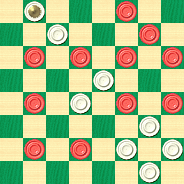
WHITE
White to Play and Win
Can you make waves with your solution, or will quantum indeterminacy hide the answer? After you've tried out the problem, click on Read More to find out.![]()
Can You Escape From The Growling Bear?
About a year ago, we presented a very difficult setting composed by Brian Hinkle, and just a few top players were able to solve it. This month, Brian has favored us with another of his offerings. It's of a very different nature than last year's, but it's a real teaser, and Brian has composed a little story to go along with it.

The amazing position shown below arose in the 40th and final game of the Go Where You Want World Title Match, played in the year 2012 at the San Francisco Checker Palace.
The match was tied 4-4 with 31 draws and the defending World Champion, Run Fora King (Black) only needed a draw to retain his title against his arch-rival Al X. Noisyev (White), better known as the "Growling Bear of Checkers" for his antics both on and off the checker board.
Early in this game, King played a gambit line in the Old 14th and The Bear responded by immediately giving back the man to obtain the best theoretical position--- at least in his view.
As the midgame progressed, the Bear offered Run a useless king in the single corner on square 29, which he accepted, being true to his name. In the late midgame, the Bear pitched a man in order to crown five White kings --- his patented "bear claw" tactic --- and place them on key squares, thus securing maximum pressure on the exposed Black pieces in the middle of the board.
Under extreme pressure and with the world title at stake, Run Fora King escaped with a draw in this difficult position, leaving the Growling Bear still hungry for the coveted and elusive GWYW World Title.
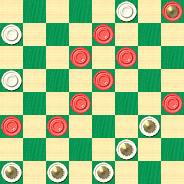
BLACK
Black to Play and Draw
B:W30,28,20,K9,K6,K4,K3,K2:BK29,26,23,22,18,15,13,12,11.
Were you able to sight solve this or did you have to move the pieces around? How long did it take you to solve it by either method?
Please send your proposed solutions and solving times to Brian Hinkle at sbhinkle@charter.net. Brian's solution and commentary will be published in the columns of The Checker Maven in the first part of 2006.
Starting with this article, we're adding FEN notation to our diagrams, at the request of our readers. If you are not familiar with FEN and PDN, a good description can be found on Wikipedia.![]()
Jackpot

Here at The Checker Maven, we've long felt that we've "hit the jackpot" with our more than 2,500 weekly readers and the acceptance and welcome our webzine has received in its first year of publication. To celebrate, we've turned to who else but Tom Wiswell, for a nice problem which he himself has entitled Jackpot. It's not too hard (at least by Wiswell standards) but has a neat finish that you can't help but admire. The problem is co-authored by Jack Botte and looks like this:
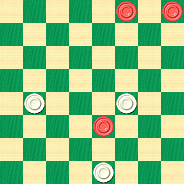
WHITE
White to Play and Win
When you've pulled the lever on your solution, click on Read More to see what Tom had to say.
[Read More]Total Insanity

This month we bring you what is possibly the most insane stroke problem ever conceived. It's a completely artificial situation and has no practical play value, but as a test of visualization it is unrivaled.

WHITE
White to Play and Win
Try this problem without (1) using your computer, and (2) getting out an extra checker set so you can move the men around on your board. In other words, be crazy and sight-solve it!
When you have the answer, or have completely gone off your rocker, click on Read More for the solution.![]()
Two Final Not-So-Easy Pieces
Today, we reach the end of the "introductory" tactical problems and examples in our ongoing electronic republication of Willie Ryan's celebrated Tricks Traps & Shots of the Checkerboard. The problems have been getting harder and harder... and we haven't even gotten to the main parts of the book! Here's Willie once more:
BLACK
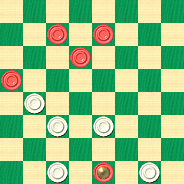
WHITE
White to Play and Win
"Many a losing position has been won or drawn, in the last minute of play, by a brilliant series of startling moves. Example 17 pictures white in what appears to be a hopeless predicament; yet white can turn the tables to win by a neat 'backup and throwback' stratagem this is as pleasing as it is deceptive. The backup idea is employed to get tactical support or 'backing' from an opponent's piece--- to use that piece as one of your own men. All compound shots are essentially based on the backup principle. A throwback or 'pitch-out' is a clever method of ousting an opponent's king from your king row (by sacrificing one or more pieces) in order to capture it on the bound.
BLACK
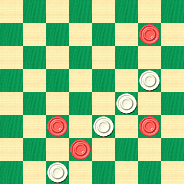
WHITE
White to Play and Win
For our closing study, Example 18, we feature an advanced player's problem that brings into play some of the tactical ideas we have discussed in the preceding examples. Instead of expecting our beginners to solve this chestnut, we will briefly review the solution and denote the play, step by step."
Whoa, just a minute there, Willie! Let's let our readers try it on their own first! After all, they can always click on Read More to see the solutions!![]()
The Checker Maven is produced at editorial offices in Honolulu, Hawai`i, as a completely non-commercial public service from which no income is obtained or sought. Original material is Copyright © 2004-2026 Avi Gobbler Publishing. Other material is public domain, AI generated, as attributed, or licensed under CC1, CC2, CC3 or CC4. Information presented on this site is offered as-is, at no cost, and bears no express or implied warranty as to accuracy or usability. You agree that you use such information entirely at your own risk. No liabilities of any kind under any legal theory whatsoever are accepted. The Checker Maven is dedicated to the memory of Mr. Bob Newell, Sr.

